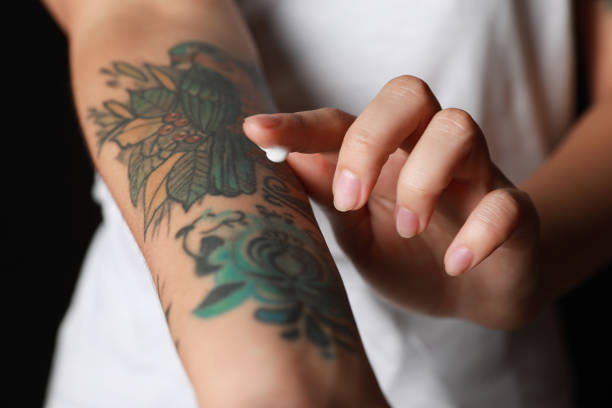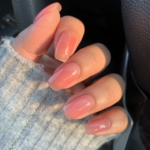Getting a new tattoo is an exciting and creative way to express yourself, but the journey doesn’t end at the tattoo parlor. Proper aftercare is crucial to ensure your new ink heals beautifully and retains its vibrancy for years to come. Among the many products available for tattoo aftercare, Aquaphor often finds its way into the conversation. But is Aquaphor good for tattoos? In this article, we’ll delve into the benefits, potential drawbacks, and alternatives to help you make the best choice for keeping your tattoo looking its best
What is Aquaphor?
Aquaphor is a popular over-the-counter skin care product known for its excellent moisturizing and protective properties. Its primary ingredients include petrolatum (41%), mineral oil, ceresin, lanolin alcohol, panthenol (also known as provitamin B5), glycerin, and bisabolol. Petrolatum and mineral oil serve as occlusive agents, creating a barrier on the skin to lock in moisture and protect it from external irritants. Cerin acts as a wax-like substance, while lanolin alcohol helps soothe and soften the skin. Panthenol and glycerin contribute to hydration and skin conditioning, while bisabolol, derived from chamomile, offers anti-inflammatory and soothing benefits.
Aquaphor is widely used for various skin concerns, including dryness, chapped lips, minor cuts, burns, and as a post-tattoo or post-procedure skin healing aid.
Is Aquaphor Good for Tattoos?
Yes, Aquaphor is often recommended as a post-tattoo ointment and is considered beneficial for tattoo aftercare. A study published in the journal Tattoo Medicine in 2020 found that Aquaphor was an effective moisturizer for tattoos. The study found that Aquaphor helped to keep the tattoo hydrated and protected, and it also helped to reduce the risk of infection. Aquaphor contains panthenol, which is a provitamin of vitamin B5 that helps to soothe the skin and promote healing.
Protects the Tattoo from Bacteria and Infection
When you get a tattoo, the skin is left vulnerable with an open wound that requires protection from bacteria and infection. Aquaphor can help with this as it forms a protective layer over the tattoo to prevent any possible contamination.
Keeps the Tattoo Moisturized
Tattooing can leave the skin dry and flaky, so it’s essential to keep it moisturized. Aquaphor is non-comedogenic, meaning it won’t clog pores, which can cause breakouts. It also keeps the skin hydrated, which promotes faster healing and reduces the risk of scabbing.
Reduces Scarring
Research published in the journal Advances in Skin & Wound Care in 2020 found that Aquaphor was effective at reducing the appearance of scabbing and peeling on tattoos. The research also concluded that Aquaphor helped to improve the overall appearance of healed tattoos.
Drawbacks
While Aquaphor is a widely used ointment for tattoo aftercare, it comes with some considerations. Aquaphor is also a very heavy ointment, and it can clog pores. This can be a problem for people with oily or acne-prone skin. Additionally, Aquaphor can trap bacteria under the skin, which can lead to infection. In fact, not everyone’s skin reacts positively to Aquaphor. Some people experience allergic reactions, rashes, or breakouts when using it.
Does aquaphor fade tattoos? There have been reports of Aquaphor causing ink loss in tattoos. This issue most often occurs with newer tattoos and tattoos with more delicate lines. This is due to the ointment not allowing the skin to breathe correctly, leading to scabbing and peeling.
How much should you use?
When using Aquaphor for tattoo aftercare, it is important to use a thin layer. You should be able to see the skin underneath the Aquaphor, but it should not be shiny or sticky. If you use too much Aquaphor, it can clog pores and trap bacteria, which can lead to infection.
Here is a good rule of thumb: use enough Aquaphor to coat the tattoo without obscuring the skin underneath. You should be able to see the colors and details of your tattoo through the Aquaphor.
If you are unsure how much Aquaphor to use, it is better to err on the side of caution and use less. You can always add more Aquaphor later if needed.
Here are some tips for applying Aquaphor to your tattoo:
- Wash your hands thoroughly with soap and water.
- Clean the tattoo area with a mild soap and water.
- Pat the tattoo area dry with a clean towel.
- Apply a thin layer of Aquaphor to the tattoo.
- Rub the Aquaphor into the skin until it is absorbed.
- Repeat steps 3-5 every few hours, or as needed.
how long to use aquaphor for tattoos
The duration for which you should use Aquaphor for your tattoo largely depends on the specific healing stages and your skin’s individual response. Typically, Aquaphor is recommended for the initial stages of tattoo healing, which usually span the first 3 to 4 days after getting inked. During this time, it helps to keep the tattooed area well-moisturized, preventing it from drying out and forming scabs prematurely. To use Aquaphor effectively, apply a thin layer to the tattooed skin several times a day, following the instructions provided by your tattoo artist or dermatologist.
After the initial 3 to 4 days, you can gradually transition to a fragrance-free, hypoallergenic lotion designed for sensitive skin. This transition phase typically lasts for another 1 to 2 weeks, or until your tattoo appears fully healed. It’s important to note that the exact timing can vary depending on individual healing rates and the size and complexity of the tattoo. If your tattoo is still feeling dry or irritated after 3-4 days, you can continue to use Aquaphor for a few more days. However, if your tattoo is healing well, you can switch to a lotion sooner.
Throughout the healing process, continue to keep the tattoo clean and well-hydrated, and always follow the aftercare recommendations provided by your tattoo artist to ensure the best results and prevent complications.
Aquaphor alternatives
Fragrance-Free Lotion
Many people switch from ointments like Aquaphor to a fragrance-free, hypoallergenic lotion after the initial healing stage. Look for a lotion that is specifically designed for sensitive or dry skin to keep the tattoo moisturized without clogging pores.
Tattoo-Specific Aftercare Products
Tattoo artists often recommend tattoo-specific aftercare products, which can include creams, lotions, or ointments specifically formulated to aid in tattoo healing. These products are designed to provide the right balance of moisture and protection.
Coconut Oil
Some individuals opt for organic, unrefined coconut oil as a natural alternative. It provides hydration and contains antimicrobial properties that can help protect the tattoo from infection.
Shea Butter
Shea butter is another natural option that can provide moisture and nourishment to the skin. Like coconut oil, it’s essential to choose a pure, unrefined product without added fragrances or chemicals.
Panthenol-Based Products
Panthenol, also known as provitamin B5, is a common ingredient in skincare products. Creams or lotions containing panthenol can promote skin healing and hydration.
Fragrance-Free Petroleum Jelly
Similar to Aquaphor, fragrance-free petroleum jelly can create a protective barrier while keeping the tattoo moisturized.
Other aftercare tips
Avoid Sun Exposure
UV rays can cause fading and damage to the tattooed skin. If you must be in the sun, use a broad-spectrum sunscreen with SPF 30 or higher and keep the tattoo covered with loose clothing.
Avoid soaking your tattoo in water
Submerging your tattoo in water can introduce bacteria and impede the healing process. Once the tattoo is fully healed, consider applying a waterproof sunscreen before swimming to protect the ink from fading.
Don’t Pick or Scratch
It’s natural for your tattoo to scab and peel as part of the healing process. However, resist the urge to pick, scratch, or peel off scabs. Let them fall off naturally to avoid damaging the tattoo and reducing the risk of infection.
Wear Loose Clothing
Opt for loose, breathable clothing over the tattooed area to minimize friction and irritation. Tight clothing can rub against the tattoo and slow down the healing process.
Stay Hydrated and Eat Well
Proper hydration and a balanced diet can support overall skin health and contribute to faster healing. Drinking enough water and consuming nutrient-rich foods can help your body repair the tattooed skin more efficiently.
FAQs
- Can I use Aquaphor if I have sensitive skin? Aquaphor can cause skin irritation in some people with sensitive skin. It’s essential to have a patch test before applying it to a new tattoo.
- How often should I apply Aquaphor to my tattoo? It’s recommended to apply Aquaphor to your tattoo 2-3 times per day for the first 2-3 days after getting your tattoo.
- Can I swim or shower while using Aquaphor on my tattoo? It’s recommended to avoid swimming and showering for the first few days after getting your tattoo. Once you begin applying lotion or ointment to your tattoo, you can shower and swim, but be sure to pat dry gently afterward.
Final Takeaway
Whether or not to use Aquaphor for tattoos depends on personal preference and skin type. While it has its benefits and drawbacks, there are also alternatives to consider. It’s recommended to patch test before applying any new product to your tattoo and to follow aftercare instructions carefully to ensure proper healing. Remember, taking care of your tattoo properly is essential for its longevity and appearance.







